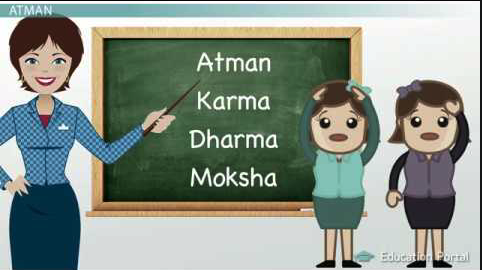Simple answers to your questions on Hinduism are provided here.
Use the search button (top right on desktop, top left on smartphones) to find specific topics of interest. At the bottom of each answer, check the “Tags” section for related topics. To learn more about this Q&A project, click [here].

On Hinduism
You can also download an earlier collection: 300QAs on Hinduism (PDF). Thank you.

32. Hindu terminologies
Ananda is a state of causeless bliss and joy.
The Hindu tradition teaches that this is our original state, not a destination to be achieved through effort and strife. We are caught in a web of ignorance and greed that deludes us about our true nature and causes us to be happy or unhappy on account of external events.
A fish does not strive to be in water, it already is. We already swim in the Ocean of ananda, but behave like a fish out of water, helpless and distraught. Realizing the truth of our original state, we can go about naturally in this world.
This is also the reason why many Indian holy men have the suffix “ananda” in their names. They have dropped their ignorance and now live in a perpetual state of causeless bliss.
.Other reading material:
Relevant videos
Contributor: Gaurav Rastogi
Location of this post (32a): https://www.hinduspeakers.org/ufaqs/what-is-ananda/
Brahman (Brahm) is limitless, eternal all pervasive energy that is in everything and powers everything and it has no beginning and no end. It is the source of this universe, the Ultimate Truth.
Brahma: Per Hinduism, everything in the universe follows the wheel of time (kaal chakra): cycle of birth-death-rebirth. Even the universe follows this wheel of time/kaal chakra and is created- preserved – dissolved and then created again. Brahma is the God of creation, responsible for manifesting the new srishti (creation, universe) after its dissolution/recycling by Shiva.
Brahmin: Brahmis are those (human beings) who have ‘sattva’ guna (harmony, knowledge and contentment) pre-dominant in them. According to Gautama DharmaSustra, a Brahmin should possess eight virtues: truthfulness, teaching the virtuous, following the rules of rituals, studying the Vedas, gentleness and nonviolence, self control and kindness and others. Brahmin’s dharma in society is to interpret and share the knowledge of Hinduism across generations. One does not become Brahmin by birth but by gunas (qualities) and karma (action).
Other reading material:
Relevant videos:
Contributor: Swati Sugandhi
Location of this page (32b): https://www.hinduspeakers.org/ufaqs/what-is-the-difference-between-brahman-brahma-and-brahmin/
Few of sanskrit words used related to God are:
Brahman is limitless, eternal all pervasive energy that is in everything and powers everything and it has no beginning and no end.
Devata from root word div or dev (दिव, that which shines) with tva (त्व/तल् प्रत्यय, being) becomes devata (देवत्वम्/देवता; a masculine form) meaning the one capacity to give. The feminine form is “Devi” and the word Devta means both Dev and Devi. Anyone who has achieved a state of supreme mastery over something and has owned it is called a “Dev”/”Devi”.
Ishvar means the supreme lord through which everything came into existence. Shiva and Vishnu are considered as “Ishvars”.
Bhagavan is Bhag + Van (someone who uplifts the Bhagya (luck) of the subject), one that possesses Bhag: Collection of 6 qualities (1. Aishwarya, 2. Veerya, 3. Yashas, 4. Shree, 5. Jnaana, and 6. Vairagya). Bhagavan (sometimes translated as “Lord”) is an epithet for a deity, particularly for the deities of Lord Krishna, Rama, Vishnu and Lord Shiva. The term is also used by Jains to refer to the Tirthankaras, particularly Mahavira, and by Buddhists to refer to Lord Buddha in India.
Parmatma (Par + atman) means the supreme soul of an Individual. Something which is above and beyond the “atman” (soul). Every individual has a “Parmatman” inside it. You are nothing but a soul, trapped in a cage of flesh and bones. Your parmatman is the state of pure consciousness.
Prabhu means lord. The provider (master) is called “Prabhu”.
Other reading material: http://www.lonelyphilosopher.com/difference-between-prabhu-ishwar-bhagwan-devta-and-parmatma/
Relevant videos:
Contributor: Manju Gupta
Location of this page (32c): https://www.hinduspeakers.org/ufaqs/explain-sanskrit-words-that-are-translated-to-god/
Om Tat Sat is known as the triple designation of Brahman—the Ultimate Reality. Each word reflects a different aspect of Truth:
- Om – The primordial sound symbolizing the Absolute, the infinite substratum on which body, mind, and intellect appear and function. It represents the pure Self beyond all limitations.
- Tat – Meaning “That,” it points to Brahman as the eternal, changeless, and perfect goal of all spiritual pursuit.
- Sat – Meaning “existence” or “truth,” it is the principle of reality present in all things we see, feel, and think—pervading the universe as the essence of being.
Together, Om Tat Sat affirms that there is only one ultimate Reality—Brahman. Chanting or contemplating on Om Tat Sat helps purify the heart, elevate thoughts, and guide actions toward truth and harmony.
Contributor: Dilip Amin
Location of this post (32d): https://www.hinduspeakers.org/ufaqs/what-is-om-tat-sat/
